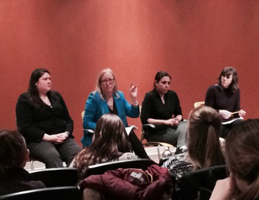Students Hear Stories of Emergency Room Violence at Dine and Discuss
March 20, 2014
 Student Affairs, Center City hosted another Dine and Discuss event on February 27 in the New College Building. Students representing a variety of health profession majors enjoyed free food and participated in a discussion about violence and trauma prevention in hospital emergency rooms.
Student Affairs, Center City hosted another Dine and Discuss event on February 27 in the New College Building. Students representing a variety of health profession majors enjoyed free food and participated in a discussion about violence and trauma prevention in hospital emergency rooms.
Students vote on the topics or issues that are featured in every Dine and Discuss event. This installment was attended by nursing, Physician Assistant, physical therapy, health administration, and Master’s in Public Health students. Four panelists discussed their own experiences of emergency room violence and trauma and also answered students’ questions.
The first panelist was Annemarie Papa, the Nurse Manager for the Hospital of the University of Pennsylvania’s Emergency Department, who shared the differences between her management and clinical experiences.
Robin Weingarten, the second panelist, is an assistant manager of the Hospital of the University of Pennsylvania’s Emergency Department unit. She was able to bring more of a non-clinical side perspective on this issue that appealed to several of the Health Administration and MPH students in attendance.
The third panelist was Megan Schneider, a faculty member in the Physician Assistant Department at the College of Nursing and Health Professions. She offered a clinical perspective from the view of a Physician Assistant and gave advice to the numerous PA students in attendance.
The last panelist was Erica Adams-Harris, an Injury and Public Health Research Fellow at Healing Hurt People, a hospital-based violence intervention program designed to reduce youth recidivism. Adams-Harris, who has often dealt with violence in the Emergency Room, offered her advice on how to care for victims of Emergency Room violence.
The topics discussed were important for all health professions students to understand. Each panelist gave insight on how to work with other employees in the hospital, from the CEOs to the technicians. Open communication was a common theme underscored by all of the panelists. They were able to provide tips for students on the importance of understanding everyone’s role within the healthcare system. Students displayed interests in areas such as how to deal with violent patients, and tips on dealing with these situations as less experienced healthcare professionals.